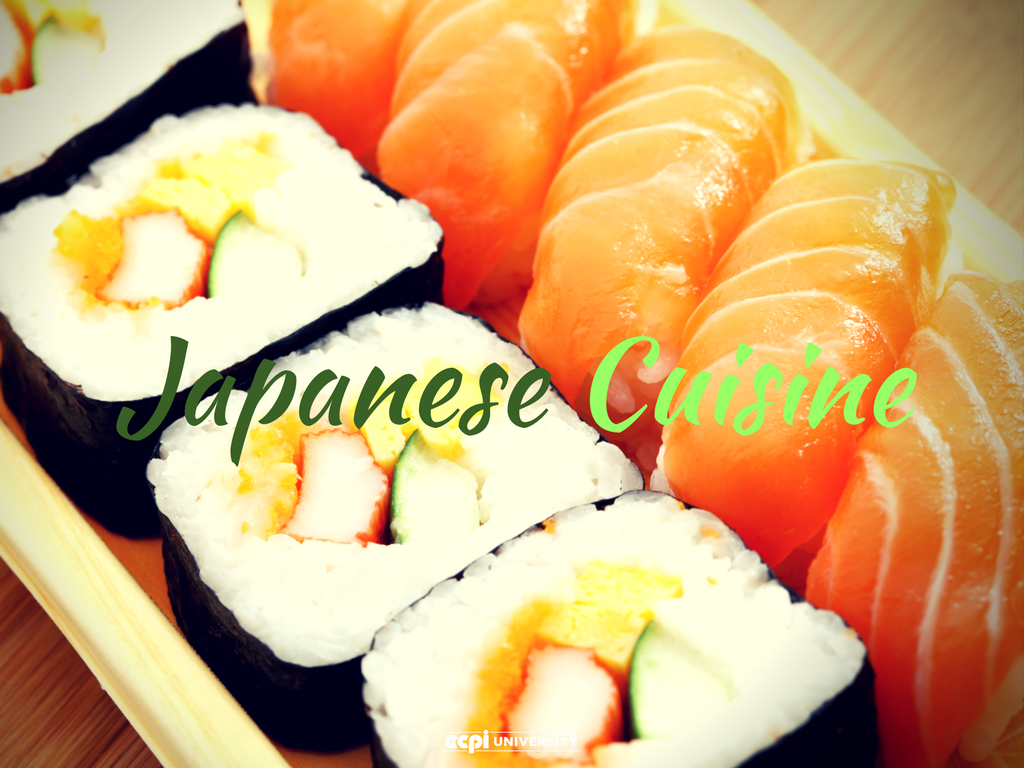Popular Japanese Cuisine for Culinary Students
Most people, even if they’ve never tried it, are familiar with sushi and sashimi. While some prefer their fish cooked, there are a lot more styles of Japanese cuisine than simply these dishes. Here are six types of Japanese foods you might encounter as you learn more about the culinary arts and how to prepare international cuisine.
Okonomiyaki: A Pan-Fried Pleasure
This food is a versatile dish whose name which loosely translates to, “to one’s liking”. The batter contains cabbage and the toppings can be anything the guest desires, including meats, kimchi, seafood, and even cheese. Although this dish has been compared to a pancake, a better comparison can be made between okonomiyaki and pizza.
Tempura: Deep-Fried Delights
Tempura is a common dish which was actually introduced to the Japanese by the Portuguese in the 16th century. It is served in two styles; the most common is coated in batter and deep fried, which was developed in eastern Japan. The other is more common in western Japan and consists of deep-frying vegetables or seafood without any coating at all.
Udon: Long Noodles with a Proud History
Udon noodles, similar to soba and ramen, are long noodles which can be served hot or cold and are often used in soups. It’s believed that a Buddhist priest brought the noodles from China. This versatile wheat noodle can be served in a variety of styles and was originally added to a miso-based soup.
Tofu: A Soy-Based Vegetarian Option for Every Meal
This dish’s origins are a mystery. Most historians trace the invention back to China, but the inventor, a Chinese royal named Prince Liu An, didn’t have access to soybeans. Regardless of how tofu arrived in Japan, it’s a popular and traditional food for the Japanese. Some common dishes include tofu served with soy sauce. But there are endless possibilities to how to prepare and serve tofu.
Tea: More than Just Hot Leaf Juice
The history of tea dates back to approximately 2700 BCE, starting in China with a legendary emperor named Shennong. When tea arrived in Japan, believed to have been brought by Buddhist priests, it quickly became known for its medicinal properties and health benefits. Tea soon became a respected part of Japanese culture. Tea ceremonies were developed and are still a part of life and spirituality in Japan.
Fugu: Fish for the Brave
‘Fugu’ is the Japanese word for puffer fish, also known blowfish. The fish is incredibly toxic, with a single puffer fish containing enough neurotoxin to kill 30 people. A dose as small as the head of a pin is considered lethal. Needless to say, you need to specialized training in order to prepare this dish and a serious love of danger to eat it. Aspiring fugu chefs in Japan train for seven years to prepare the meal.
They use a specialized knife and technique to cut away the toxic organs without harming the meat of the animal. Your final test to eat the fugu you prepared and about 70% of applicants fail the test. Even with such careful restrictions, deaths and hospitalizations can still happen.
Are you interested in learning how to prepare international cuisine, such as the foods listed above? If you’re planning to earn an Associate’s Degree of Applied Science in Culinary Arts, consider ECPI University's Culinary Institute of Virginia for your education. With year-round classes and an accelerated schedule, you can earn your degree faster and start working in a professional kitchen sooner. Contact ECPI University today to see if our culinary arts program is right for you. We won’t teach you how to prepare fugu, though. You’re on your own for that one.
It could be the Best Decision You Ever Make!
DISCLAIMER – ECPI University makes no claim, warranty, or guarantee as to actual employability or earning potential to current, past or future students or graduates of any educational program we offer. The ECPI University website is published for informational purposes only. Every effort is made to ensure the accuracy of information contained on the ECPI.edu domain; however, no warranty of accuracy is made. No contractual rights, either expressed or implied, are created by its content.
Gainful Employment Information – Culinary Arts - Associate’s
For more information about ECPI University or any of our programs click here: http://www.ecpi.edu/ or http://ow.ly/Ca1ya.




